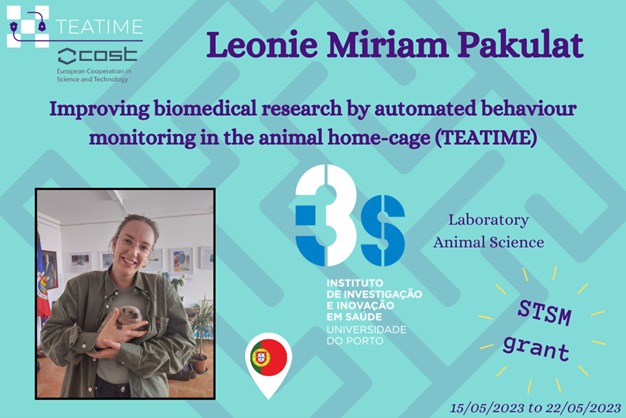
Details of the STSM
Title: Improving biomedical research by automated behaviour monitoring in the animal home-cage (TEATIME)
Start and end date: 15/05/2023 to 22/05/2023
Host: Laboratory Animal Science Group (LAS), University of Porto, Portugal
Host website: https://www.i3s.up.pt/research-group.php?groupid=29
Description of the work carried out during the STSM
I visited the Laboratory Animal Science Group (LAS) at the University of Porto under the supervision of Nuno Franco for one week. During my visit I have been shown the in-house developed automated cages for mice and met with the engineering student who has developed this system to understand its components, as well as discussing the needs for my own project and how this would differ from the existing system. The system is built to accommodate read outs for body temperate, ambient temperature and humidity, as well as movement patterns of the mice requiring a sophisticated system of 6 coils embedded in a 3D printer frame detecting implanted radiofrequency identification (RFID) tags by switching on and off in a loop fashion, as well as data storage and transmission. For the proposed project, measuring body temperature in adult female mice to determine whether their estrous cycle stages can be identified, not all functions will necessary. It will require only one or two temperature measurements during a 2-hour time window and other features integrated into the existing system are not needed. This will allow for a significant simplification of hardware structures. Optimization factors, such as placement of a single coil, location of the RFID tags on the mice and local data storage have been discussed. With input from Nuno Franco and others I have come up with a protocol for a pilot experiment to test proof of concept at the home institute (University of Cambridge). I have become familiar with the equipment needed and identified suppliers in the United Kingdom (UK).
We have been able to develop a protocol for a pilot experiment at the home institute to test whether the body temperature of adult female mice changes sufficiently throughout the estrous cycle to identify fertile and infertile states as set out in the expected outputs of the STSM. We will also identify an ideal time point for the measurements to be taken to maximize temperature differences.
If we are able to reliably detect estrous as peaks in body temperature, we will collaborate with Nuno Franco to build a scaled down version of their autonomous cage monitoring system to fit our cages and racks. A simplified system will take body temperature measurements a few times during a previously identified time window, storing the data on a memory card which can then be read at convenience. This system will then allow us to remotely monitor estrous cyclicity by proxy of body temperature, reducing the necessity for repetitive vaginal lavage, which requires restraint of the animal and as such induces stress responses.
Additionally, it will enable us to monitor the onset of estrous cyclicity by remotely monitoring body temperature starting postnatal day 21 and following the animal throughout puberty.